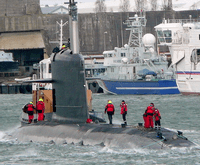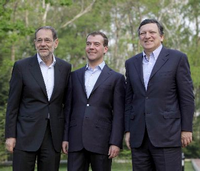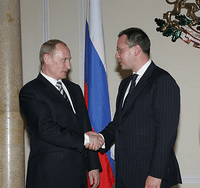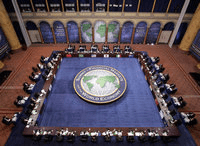On a related note to the previous post about the shifting U.S.-Israel relationship, there’s been a lot discussion in France regarding the shift in France’s posture in the Israeli-Palestinian conflict under President Nicolas Sarkozy. Sarkozy has been accused of essentially adopting a pro-Israeli position that reverses France’s historic sympathy and advocacy for the Palestinian cause. I’d argue that that misses a lot of the context, and some of the finer points, of Sarkozy’s shift. To begin with, France’s historic pro-Palestinian position is no longer as necessary as it once was, for the simple reason that it has become the Western […]
Europe Archive
Free Newsletter

As if to illustrate the challenges facing an integrated European defense market, the French naval shipyard DCNS is suing Spain’s leading state-owned shipbuilding firm, Navantia, for allegedly stealing trade secrets relating to the Scorpène submarine project. The two companies originally developed the Scorpène as part of a joint venture. But DCNS now accuses its Spanish partner of copying Scorpène technology and using it for the new S-80 submarine that Navantia is building both for the Spanish Navy as well as for export markets, where it will compete with the Scorpène. Navantia says the dispute originated in July 2005, when the […]
Yes, well, this is no surprise, really. I’d be pretty keen on directing a major potential competitor far away from the market I’m trying to corner, too. And if I could make some money on the deal, all the better. Unfortunately, the last “I” — for India — is no longer a sure thing on the IPI “Peace” Pipeline. The stabilizing effect that would have had would have made the deal at least a palatable trade-off for losing Iranian gas for Nabucco. Now I’ve seen some reports that the Iranian gas might end up in China after transiting Pakistan. If […]
Aside from being confused with its much larger neighbor, Nigeria, to the west, Niger rarely commands the attention of the global spotlight. That’s probably why yesterday’s report that its president, Mamadou Tandja, has suspended Parliament in retaliation for its refusal to grant him permission to run for a constitutionally prohibited third term has barely caused a media ripple. In recent years Niger has been known for two things. It’s the place where Saddam Hussein was alleged to have bought “yellowcake” uranium, a claim later debunked by Joseph Wilson. It’s also the site of one of Africa’s longest-running, low-level civil wars. […]
You might have seen that French President Nicolas Sarkozy was in Abu Dhabi to inaugurate a French military and naval base there. (Le Figaro here, Le Monde here.) Then again, you might not have. The base, which has been in the works for the past year, is the first permanent overseas French installation not located in one of its former colonies. Also significant (to the French probably more so than to the British) is that the UAE is a former British colony, making the arrangement something of an “encroachment” on the Anglo-Saxon sphere of influence. Although the announcement last year […]
Ria Novosti reports that India has ruled out the Russian-manufactured Il-78 for its upcoming purchase of aerial tankers, due to concerns over spare parts and after-sales service for a fleet purchased six years ago. That made me think of this Richard Weitz column from the WPR archives, back in February, describing the challenges facing the Russian defense industry. The related decline of the Indo-Russian defense relationship at the very moment that India will begin to play a more prominent regional security role is one of the more important defense industry trends going relatively unnoticed in the mainstream press these days, […]
Not quite sure what to make of this one, whereby the EU is subsidizing this effort to create a “common news market” by translating the top news around the Union into all the member states’ languages. On the one hand, the language divergence is an inherent handicap to the emergence of a common identity, and its manifestation in the realm of news and information is an obstacle to the formulation of a common political agenda. India, for instance, experiences the same phenomenon. (The inherent market limitations of its multi-language territory, by the way, is another reason why the printed press […]
The Bremer model seems like an odd choice for a country fending off social unrest and economic crisis. For Russia, the professionalization of the military came five years too late, or else the global downturn came five years too early. Either way, instead of transitioning officers into a boom economy, they’re left with unkept promises and Soviet-style phantom waiting lists. Not the kind of guys I’d want idle and angry these days.

Two frustrating EU summit meetings last week, with China and Russia, served to illustrate the EU’s well-known difficulties in conducting foreign policy under its presently awkward institutional structure. These problems have propelled efforts to adopt the Lisbon Treaty, which will restructure how the EU manages its foreign policy representation and decision-making. Even with more coherent foreign policy machinery, however, the EU would still find it difficult to achieve its objectives in the case of difficult dialogue partners such as China and Russia. The May 20 meeting in Prague with a visiting Chinese delegation marked the 11th EU-China summit since 1998. […]
Couldn’t help but chuckle over this, from an EU Observer wrap up of the EU-Russia summit. Apparently, prior to the summit, Czech President Vaclav Klaus got quoted as saying that, as a “big, strong and ambitious country,” Russia deserved more attention than, say, Estonia and Lithuania. To which, in addition to summoning the Czech ambassador, Estonian President Toomas Hendrik Ilves replied: I amsurprised that such a regrettable phrase, which divides Europeancountries into important and unimportant ones, were expressed by aCzech. Translation from the Diplospeak: Who you calling a twerp, twerp?

On May 8, the Czech Republic hosted a long-awaited Nabucco Summit under the auspices of its European Union (EU) presidency. Notably, the meeting convened just as the Bulgarian government finalized its participation in Russia’s competing South Stream pipeline. A little-noticed element of the negotiations in Moscow, however, was Bulgaria’s effort to link its participation in South Stream with Russian financing for a domestic nuclear power program. Pipeline politics may generate headlines, but Bulgarian officials expect nuclear power to generate most of their future electricity. And Bulgaria’s South Stream agreement demonstrates the perverse incentives which arise when EU energy security and […]

When the global financial contagion kicked in last fall, the blogosphere was quick to predict that a sharp uptick in global instability would soon follow. While we’re not out of the woods yet, it’s interesting to note just how little instability — and not yet a single war — has actually resulted from the worst global economic downturn since the Great Depression. Run a Google search for “global instability” and you’ll get 23 million hits. But when it comes to actual conflicts, the world is humming along at a level that reflects the steady decline in wars — by 60 […]
Around 100,000 homeowners in the earthquake-stricken town of l’Aquila, in central Italy, have filed for financial aid to rebuild their primary homes destroyed or damaged in the April 6 tremors. Curiously, l’Aquila only has about 70,000 registered homeowners. “There is obviously a discrepancy in the numbers, and we need to check it quickly to determine the reason for it,” Massimiliano Cordeschi, a regional official, conceded blithely in a television interview Wednesday. Meanwhile, reconstruction of the ancient town nestled in the Abruzzi Mountains — where almost every structure suffered some damage — has been held up pending the investigation, with thousands […]
The surprising part of this EU Observer article isn’t that British refinery workers called a two-day strike to protest the the hiring of 40 foreign workers by a subcontractor. Nor is it that the parent company eventually caved, and promised to replace them with homegrown British workers. No, what surprised me was that Britain’s government statistics shop reported that foreign workers are increasingly leaving Britain, and fewer are coming to replace them. Now I’m not sure if that reflects the reality (i.e., including undocumented workers). But it suggests that the economic downturn, at least in Britain, has had the opposite […]
Also of note this week was the EU-China summit, which seems to have gone a bit smoother than the EU-Russia summit I mentioned. One predictable point of contention was the EU’s insistence on human rights concerns (Tibet, Burma), to which Chinese Premier Wen Jiabao replied, in so many, Mind your own business. That they will, of course. Still, what caught my eye is how much weight the EU’s much-derided soft power really carries, after all. Not necessarily in the realm of human rights, where Wen could basically send it packing, but in the power of its market to exert a […]
I’d like to say that I realized today would be the Federal Republic’s 60th anniversary when we scheduled this week’s feature issue on Germany six weeks ago. But truth is, I didn’t. I’m fairly certain Hampton did, though. Either way, it’s a good excuse to plug the issue again, because it’s a great collection of articles on a “quiet” subject that’s worthy of more attention. Another good excuse to plug the issue is this Al Jazeera piece about Dmitry Medvedev calling out the EU on its Eastern Partnership at the EU-Russia summit meeting yesterday. The Eastern Partnership, as Max Bergmann […]
A British-based campaign aimed at ending the use of loud music by U.S. interrogators as a means of exerting psychological influence over detainees is reaching across the pond in an effort to bring American musical icons Bruce Springsteen and Eminem on board. A diverse group of mostly British artists and musicians has already joined the “Zero dB” campaign, launched last December by Reprieve — a legal charity that is representing more than two dozen Guantanamo detainees. U.S interrogators have been using the music — pumped into cells at extremely loud levels for as much as 20 hours a day, for […]
